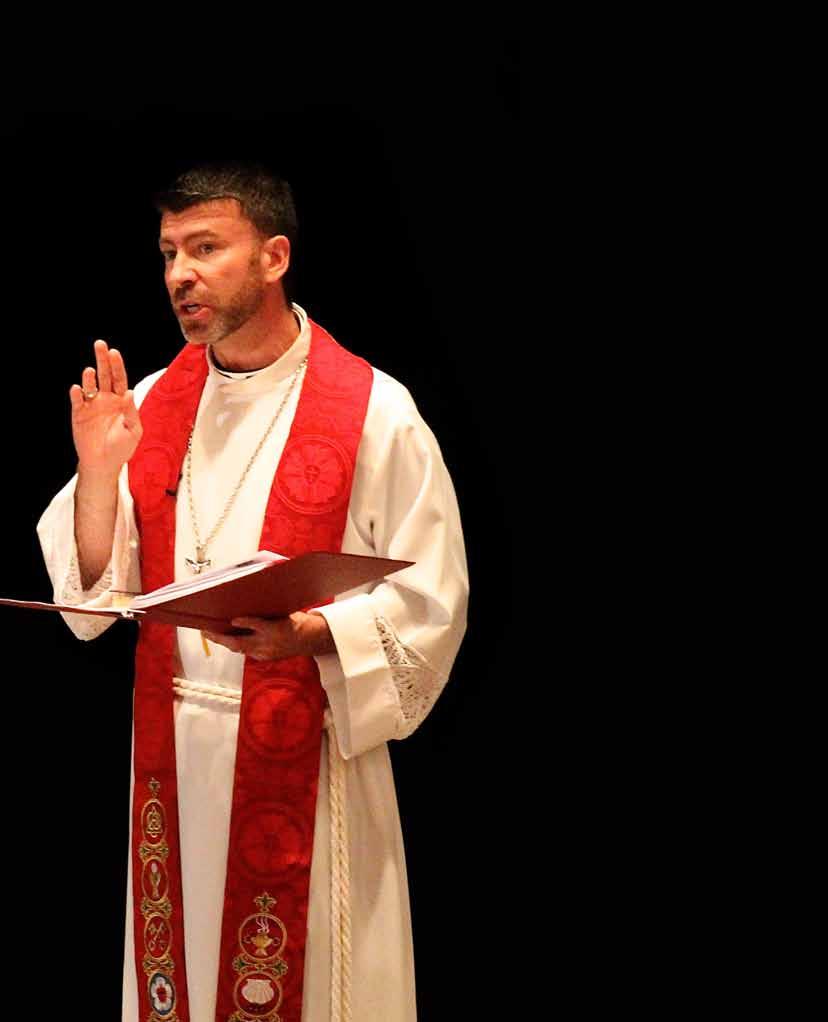
3 minute read
Catechism: Invocation
By Rev. William M. Cwirla
We’re going to take a little detour in our walk through the Small Catechism to do some “liturgical catechesis,” connecting the liturgy to the catechism and asking the big catechism question “What does this mean?” of various parts of the Divine Service.
Advertisement
Let’s begin at the beginning.
“In the Name of the Father and of the Son and of the Holy Spirit. Amen.” The Divine Service begins with an “invocation” of the Triune God. To invoke means to call upon. In the Invocation, we are calling upon the Name of the Triune God. You might recognize this formula from Matthew 28:19, where Jesus commissions His disciples to make disciples by baptizing “in the Name of the Father and of the Son and of the Holy Spirit.” It doesn’t get more Trinitarian than that. In fact, had Jesus not said it that way, we wouldn’t be saying it either.
The Invocation is a good example of liturgical shorthand. It’s not even a complete sentence! Liturgical language tends to be dense, compact speech, not wasting a lot of words—much like the Creed with its theology densely packed into short, punchy phrases. “In the Name of the Father and of the Son and of the Holy Spirit” means something like this: “We have been gathered here by the Holy Spirit as God’s baptized children under the lordship of Jesus Christ to hear His Word, receive His gifts, lay claim in faith to His promises, and call upon Him in prayer, praise, and thanksgiving according to His command and promise.” That’s quite a mouthful, isn’t it? It’s far more economical simply to say, “In the Name of the Father and of the Son and of the Holy Spirit.”

The Invocation reminds us of who we are. We have been named and claimed by God. We are baptized, reborn “from above” children of God, who through water and the Holy Spirit have been called, gathered, enlightened, sanctified, and kept in Jesus Christ. As God’s children, we are given to pray “hallowed be Thy Name,” asking that God’s Name would be holy on our lips and in our lives, in our words and work, and that we as the children of God would reflect our Father who is in heaven. We are gathered “in the Name” to call upon God’s Name in prayer, praise, and thanksgiving as He has commanded us in the 2 nd Commandment and has promised to hear us.
The Invocation is a confession of who God is, and it distinguishes Christian worship from all other religious gatherings. There are many “gods” in this world and many names by which those “gods” are named.
To invoke the Name of God is to lay claim to His promises. God’s Name is God in action. When Moses was sent to Pharaoh in Egypt to lead the Israelites out of captivity, one of the first things he asked of God in the burning bush was “What is your Name?” Moses couldn’t just show up on Pharaoh’s doorstep by his own authority. He needed to know the Name of the God who was sending him, and with the Name of God comes everything that God is and does: His authority, power, might, mercy, grace, and forgiveness. There is power to save in the Name of God, and that saving power is made known to us in the liturgy of Word and Sacrament.
It is customary to cross oneself at the Invocation with the words “and of the Son.” This gesture reminds us of Jesus’ sacrifice for our sins on the cross and of our baptismal union with Jesus in His death and life. In Baptism, we were marked with the sign of Jesus’ victory over sin and death, and now, as newborn soldiers of the Crucified One who bear His mark on our brows, we invoke the Triune Name in our battle against the devil, the unbelieving world, and our own sinful flesh. The troops are gathered in the Name of the Lord of Hosts.
The Invocation is echoed in the Benediction, the last words of the liturgy. What begins in the Name ends in the Name. In the Name of God we are gathered, and in the Name of God we are scattered into our various priestly vocations in the world to serve our neighbor in the Name of the Father and of the Son and of the Holy Spirit.
Rev. William M. Cwirla is the pastor of Holy Trinity Lutheran Church in Hacienda Heights, California, and is a president emeritus of Higher Things. He can be reached at wcwirla@gmail.com.








